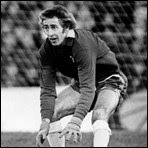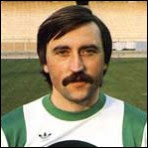 charrúa This stout porter heights of 1.84 and 94 kilos was a symbol of the legendary conquest of the selection of Uruguay in the 1950 World Cup, knocking Brazil favoritism the final against 200 thousand stunned fans at the Maracana.
charrúa This stout porter heights of 1.84 and 94 kilos was a symbol of the legendary conquest of the selection of Uruguay in the 1950 World Cup, knocking Brazil favoritism the final against 200 thousand stunned fans at the Maracana. Roque Gaston Maspoli owned a longevity unmatched 64 years dedicated to football. In the first jumps with 16 tender years at the legendary Centenario stadium in the 30's, with the sheepskin of Nacional, until the last game of the Uruguayan national team in World Cup qualifying round of 98, when at age 80 led the combined sky against Argentina in Buenos Aires.
Two opposing realities directly and dramatically distant few experienced with such intensity ...
goalkeeper Maracanazo "National kept goal to age 22, when he signed for Liverpool Uruguay, staying a year with the Nerazzurri.
But it would be to transfer to Peñarol, when she was a highlight. With the team aurinegro would be six-time champion Uruguay by Uruguayan football sacred cows as Obdulio Varela, Juan Schiaffino and Alcides Ghiggia. Mainly in the 49 team, aptly called "The Machine."
"The great goalkeeper" let the gloves at age 38, a year after leading the "Celeste Olimpica" to fourth place in the 1954 World Cup in Switzerland. Later, build a solid career as a trained noting especially his beloved Peñarol.
One Maspoli last public appearances was at the show due Cup Final 1999 in Paraguay, when he was interviewed by the Uruguayan journalist Jorge Barraza. Maspoli said that Brazil was not so superior in that fateful afternoon of July 16, 1950 for the Brazilians. "We had almost no prepared. A month earlier, we played three games against Brazil. The first one we won 4 to 3. Scored an offside goal and a half so strange. In the second, they won 2 to 1 with an own goal by Matias Gonzalez. In the third won 1 to 0 with a goal 42 in the second half. We were very evenly matched, "he recalled.
The legendary Uruguayan goalkeeper also said that after they received the tying goal, the Brazilian team fell apart, through no fault of the players, but the public pressure made a deafening noise during the game that wore down mentally Brazilian players. Then he tried to make Ghiggia second goal and strengthen the global bicampeonato Celeste Olímpica. "At FNAL the game, there was a play where a Brazilian player fell to the ground, and when I help him up, he was pale, ice cream ... what killed them!" Said the old guardamento, at age 81.
Roque Gaston Maspoli died on the night of February 22, 2004, twelve days after admission to hospital due to a lung infection. Who accompanied him during the final moments was Julius Caesar Abbadie, a former partner at the time of selection, in 1954. Also exciting was the tribute he received from fans in the game aurinegros Libertadores Cup 2004 between Peñarol and Sao Caetano. "Ole, ole, ole, ole, Roque, Roque," shouted the crowd.
After the death of Omar Miguez in 2006, now the executioner of canarinha Alcides Ghiggia is the sole survivor among those who were head of the combined historical celeste 1950.
Source: Trivela





